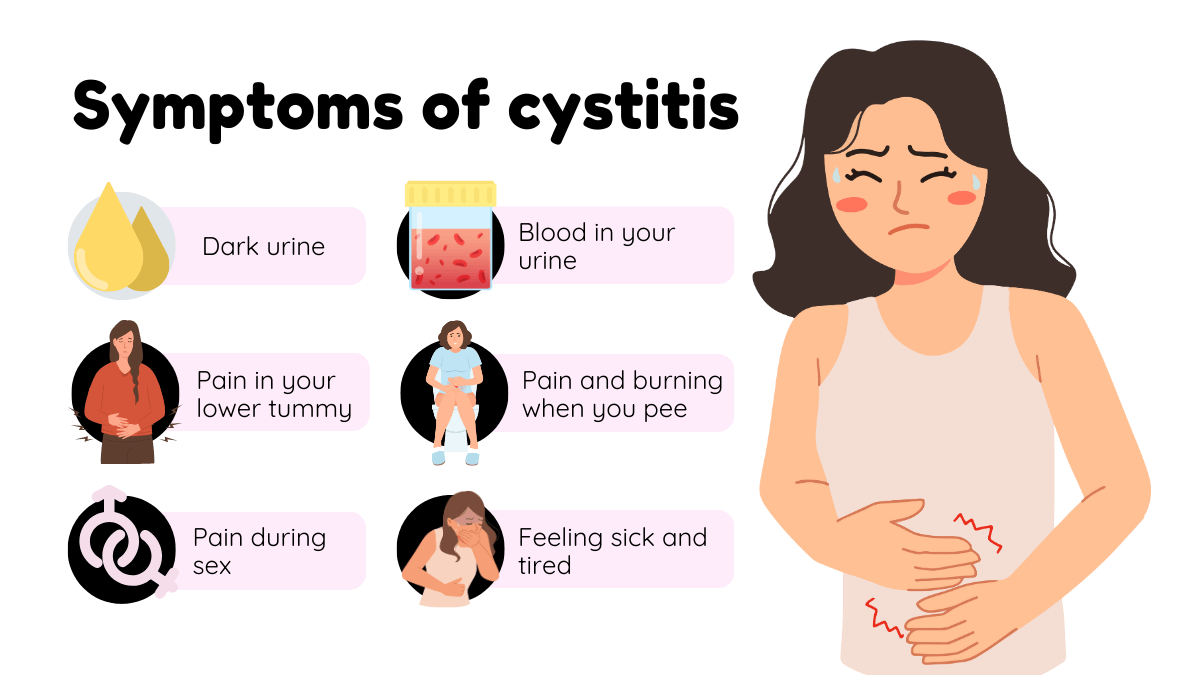Can Cystitis Go Away On It's Own?
Table of Contents
Cystitis, an inflammation of the bladder, is a common condition that many people, especially women, experience at some point in their lives. Indicated by a frequent need to urinate, pain or burning during urination, and lower abdominal pain, cystitis can be both uncomfortable and inconvenient. However, a question that often arises is whether cystitis can be treated without medical intervention. Understanding the natural course of cystitis, the body’s ability to fight off infections, and when to seek medical help is important for anyone dealing with cystitis.
In this blog, we’ll examine the nature of cystitis, its causes, and the body’s response to it. We’ll also explore when self-care might be adequate and when it’s necessary to consult our pharmacist. Join us as we unload the complexities of cystitis and give advice on managing this common yet often misinterpreted condition.

What’s the difference between cystitis and a UTI?
Cystitis and urinary tract infections (UTIs) are often used interchangeably, but they refer to different aspects of urinary health. Understanding the distinction between the two can help in accurately identifying and treating these conditions.Cystitis
Cystitis specifically refers to inflammation of the bladder. This inflammation is usually caused by a bacterial infection, but it can also be triggered by certain medications, radiation therapy, or irritants such as feminine hygiene sprays, spermicidal jellies, or long-term catheter use. Common symptoms of cystitis include:- A persistent, urgent need to urinate
- A burning sensation when urinating
- Passing small amounts of urine frequently
- Cloudy, dark, or strong-smelling urine
- Pelvic discomfort
- A feeling of pressure in the lower abdomen
Urinary tract infection (UTI)
A urinary tract infection (UTI) is a broader term that encompasses infections anywhere in the urinary system, which includes the kidneys, ureters, bladder, and urethra. UTIs are typically classified into upper and lower urinary tract infections:- Lower UTIs: These affect the bladder (cystitis) and the urethra (urethritis).
- Upper UTIs: These involve the kidneys (pyelonephritis) and the ureters.
- A strong, persistent urge to urinate
- A burning sensation when urinating
- Passing frequent, small amounts of urine
- Urine that appears cloudy, red, bright pink, or cola-colored
- Strong-smelling urine
- Pelvic pain (in women)
- Rectal pain (in men)
- Fever, chills, nausea, and vomiting (more common in upper UTIs)
Key differences
While all cystitis is a type of UTI, not all UTIs are cystitis. The key differences lie in the specific location and extent of the infection within the urinary tract. Cystitis is found in the bladder, whereas a UTI can involve any part of the urinary system, including the kidneys and ureters, which can lead to more severe symptoms and complications.What are cystitis symptoms?
Here are the common symptoms associated with cystitis:Frequent urination
One of the tell-tale signs of cystitis is the frequent urge to urinate. You may feel the need to go to the toilet much more often than usual, even if you pass only small amounts of urine each time.Pain or burning sensation
A sharp pain or burning sensation during urination is another common symptom. This discomfort can make urination a particularly unpleasant experience.Lower abdominal pain
People with cystitis often experience pressure, pain, or discomfort in the lower abdomen or pelvic area. This can range from mild discomfort to severe pain.Cloudy or strong-smelling urine
Cloudy, dark urine or urine with a strong, unpleasant smell can indicate cystitis. This difference in urine appearance is down to the presence of bacteria and white blood cells.Hematuria (blood in urine)
In some cases, cystitis can cause blood to appear in the urine, making it look pink, red, or cola-colored. If you experience this symptom, immediately seek medical attention.Urinary urgency
A persistent, urgent need to urinate, even immediately after emptying the bladder, is a common symptom. This urgency can disrupt daily activities and sleep.General malaise
Though less common, some people with cystitis may experience general feelings of being unwell, such as fatigue, mild fever, or a sense of unease.Increased nighttime urination
Needing to urinate more frequently at night (nocturia) can be a symptom of cystitis. This can disturb sleep and contribute to overall fatigue.Pelvic discomfort
Some people may feel a dull ache or discomfort, specifically in the pelvic region, which can sometimes be confused with menstrual cramps in women.
Can cystitis go away on its own?
Cystitis often poses the question: Can it be resolved without medical attention? The answer depends on the type and severity of the cystitis. While some cases may clear up on their own, others require treatment to prevent complications.Mild cases of cystitis
In certain mild cases, particularly those not caused by a bacterial infection, cystitis may indeed resolve on its own. Examples include:- Irritant-induced cystitis: Cystitis caused by exposure to bladder irritants (such as certain soaps, feminine hygiene sprays, or spermicidal products) may improve once the irritant is removed.
- Interstitial cystitis: This chronic condition, also known as painful bladder syndrome, can have erratic symptoms that may sometimes get better without direct treatment, though it often requires continued management.
Bacterial cystitis
Bacterial cystitis, the most common type, is typically caused by bacteria such as Escherichia coli (E. coli). While the body’s immune system can sometimes clear a mild infection, there is a risk of the infection worsening or spreading to the kidneys if left untreated. For this reason, medical treatment with antibiotics is usually recommended to ensure full resolution and prevent complications.What happens to untreated cystitis?
Untreated cystitis involving the bladder can lead to several complications if left unchecked:- Spread of infection: Without treatment, the bacteria causing cystitis can potentially spread to the kidneys, leading to a more serious infection known as pyelonephritis. This condition can cause fever, chills, back pain, and nausea.
- Chronic infection: Some cases of untreated cystitis can become chronic, with symptoms happening frequently or persisting for a lengthy period. This can significantly impact the quality of life and may require more intensive treatment methods.
- Increased risk in certain populations: Individuals with untreated cystitis are at a higher risk of complications, especially pregnant women, elderly individuals, and those with underlying health conditions that compromise their immune systems.
- Impact on daily life: Symptoms such as frequent and urgent need to urinate, pain or burning sensation during urination, and lower abdominal discomfort can worsen over time if cystitis is not treated promptly.
How long do cystitis symptoms last?
The duration of cystitis symptoms can change depending on several factors, including the cause of the infection, the individual’s health, and whether treatment is received promptly. In general, here are some typical timelines for cystitis symptoms:- Acute cystitis (uncomplicated): If treated promptly with antibiotics, symptoms such as urinary urgency, frequency, and discomfort during urination often improve within a few days (usually within 1-3 days). Symptoms may completely resolve within a week.
- Chronic or recurrent cystitis: When cystitis becomes chronic or recurrent, symptoms may last for longer periods, with flare-ups occurring intermittently over weeks or months. Control of chronic cystitis typically involves longer-term strategies to prevent flare-ups from happening again.
- Untreated cystitis: Without treatment, symptoms may persist or worsen over time. The infection can potentially spread to the kidneys, leading to more severe symptoms and complications (as discussed earlier).
How to ease cystitis symptoms
To ease the symptoms of cystitis, there are several at-home remedies you can take:- Drink plenty of water: Increasing your fluid intake helps flush out bacteria from your urinary tract. Water is the best choice, but you can also consume unsweetened cranberry juice, which may help prevent bacteria from clinging to the bladder wall.
- Urinate frequently: Ensure you empty your bladder fully when you urinate. Holding urine can allow bacteria to multiply in your bladder.
- Avoid irritants: Reduce consumption of caffeine, alcohol, spicy foods, and acidic foods or drinks (like citrus fruits and juices) that can irritate the bladder and worsen symptoms.
- Use heat: Applying a heating pad or hot water bottle to your lower abdomen can help relieve discomfort and reduce bladder pressure.
- Pain relief: Over-the-counter pain relievers such as paracetamol (acetaminophen) or ibuprofen can help alleviate pain and reduce inflammation. Always follow the dosage instructions on the package.
- Personal hygiene: Keep the genital area clean and dry. Avoid using strong soaps, perfumed products, or douches, as these can irritate the urethra.
- Cranberry products: Some studies suggest that cranberry products may help prevent recurrent cystitis by preventing bacteria from sticking to the bladder wall. However, evidence of their effectiveness is mixed, and they should not be relied upon as a sole treatment.
When to seek medical treatment
Severe symptoms: If you experience severe pain in your lower abdomen or back or if you develop fever, chills, nausea, or vomiting, these could indicate a more serious infection, such as pyelonephritis (kidney infection), which requires prompt medical attention. Persistent symptoms: If your symptoms do not improve within a few days of home care measures or if they worsen despite self-care efforts. Recurrent infections: If you have frequent episodes of cystitis (more than three times a year), our pharmacist may need to examine you further to determine whether there are underlying factors contributing to the recurrence. Pregnancy: If you are pregnant and suspect you have cystitis, it’s important to speak to our pharmacist immediately. Untreated urinary tract infections during pregnancy can lead to complications for both the mother and the baby. Underlying health conditions: If you have diabetes, kidney problems, or a weakened immune system, you may be at higher risk of complications from urinary tract infections. Discussing your conditions with our pharmacist early can help prevent these complications. First-time occurrence: If you are experiencing symptoms of cystitis for the first time, it’s advisable to consult our pharmacist for proper diagnosis and treatment.How The Family Chemist can help
Nitrofurantoin MR 100mg Capsules (Macrobid)- Price: From £11.49
- Dosage: 1 tablet twice daily for 3 days
- Features: Short 3-day course, modified release
- Price: From £11.49
- Dosage: 1 tablet twice daily for 3 days
- Features: Short 3-day course, targeted treatment
- Price: From £28.49
- Delivery: Free special delivery, next working day
- Features: Combination treatment for enhanced effectiveness
- Complete an online consultation.
- Choose your preferred medication.
- Receive discreet delivery.

